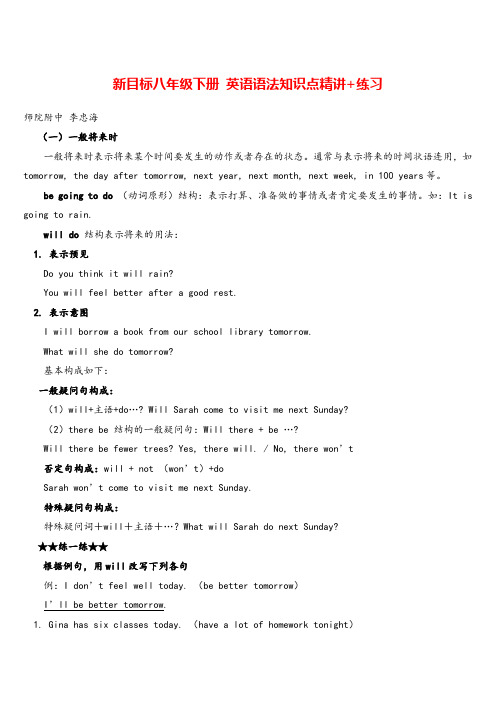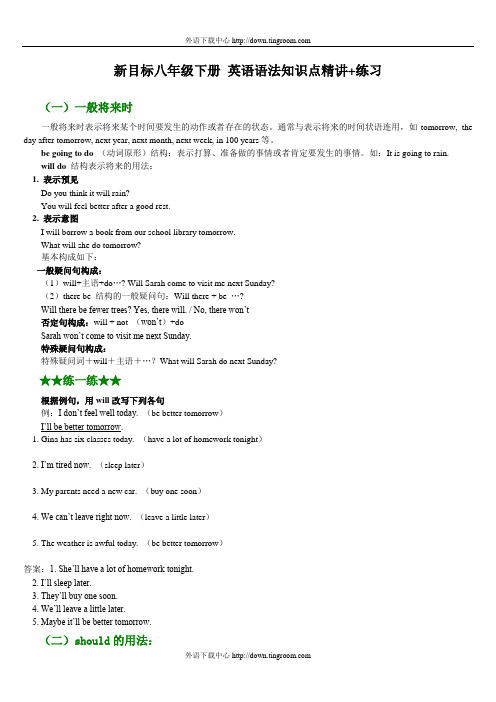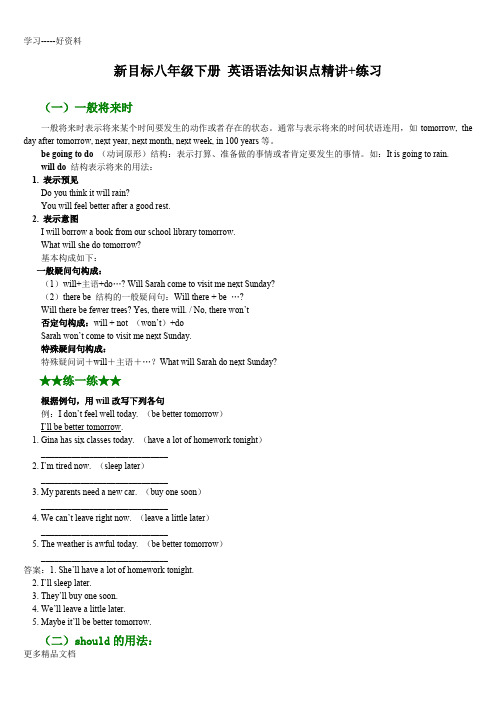新目标八年级下册 英语语法知识点精讲 练习
人教版八年级下册英语英语语法知识点精讲+练习

新目标八年级下册英语语法知识点精讲+练习师院附中李忠海(一)一般将来时一般将来时表示将来某个时间要发生的动作或者存在的状态。
通常与表示将来的时间状语连用,如tomorrow, the day after tomorrow, next year, next month, next week, in 100 years等。
be going to do(动词原形)结构:表示打算、准备做的事情或者肯定要发生的事情。
如:It is going to rain.will do结构表示将来的用法:1. 表示预见Do you think it will rain?You will feel better after a good rest.2. 表示意图I will borrow a book from our school library tomorrow.What will she do tomorrow?基本构成如下:一般疑问句构成:(1)will+主语+do…? Will Sarah come to visit me next Sunday?(2)there be 结构的一般疑问句:Will there + be …?Will there be fewer trees? Yes, there will. / No, there won’t否定句构成:will + not (won’t)+doSarah won’t come to visit me next Sunday.特殊疑问句构成:特殊疑问词+will+主语+…?What will Sarah do next Sunday?★★练一练★★根据例句,用will改写下列各句例:I don’t feel well today. (be better tomorrow)I’ll be better tomorrow.1. Gina has six classes today. (have a lot of homework tonight)_____________________________2. I’m tired now. (sleep later)_____________________________3. My parents need a new car. (buy one soon)_____________________________4. We can’t leave right now. (leave a little later)____________________________5. The weather is awful today. (be better tomorrow)_____________________________答案:1. She’ll have a lot of homework tonight.2. I’ll sleep later.3. They’ll buy onesoon.4. We’ll leave a little later.5. Maybe it’llbe better tomorrow.(二)should的用法:should用来提出建议和忠告,后边加动词原形,否定句直接在should后边加not.例如:I think you should eat less junk food.我认为你应该少垃圾食品。
人教版新目标八年级下册-英语语法知识点精讲+练习

2016年八年级下册英语语法知识点(一)一般将来时一般将来时表示将来某个时间要发生的动作或者存在的状态.通常与表示将来的时间状语连用,如tomorrow, the day after tomorrow,next year,next month,next week, in 100 years等.be going to do (动词原形)结构:表示打算、准备做的事情或者肯定要发生的事情。
如:It is going to rain.will do 结构表示将来的用法:1。
表示预见Do you think it will rain?You will feel better after a good rest.2。
表示意图I will borrow a book from our school library tomorrow.What will she do tomorrow?基本构成如下:一般疑问句构成:(1)will+主语+do…? Will Sarah come to visit me next Sunday?(2)there be 结构的一般疑问句:Will there + be …?Will there be fewer trees? Yes,there will. / No,there won’t否定句构成:will + not (won’t)+doSarah won’t come to visit me next Sunday。
特殊疑问句构成:特殊疑问词+will+主语+…?What will Sarah do next Sunday?(二)should的用法:should用来提出建议和忠告,后边加动词原形,否定句直接在should后边加not。
例如:I think you should eat less junk food。
我认为你应该少吃垃圾食品。
She drives a lot and she seldom walks. So I think she should walk a lot.她经常开车,很少走路。
人教版新目标八年级下册15单元英语语法知识点精讲练习

新目八年下册英法知点精 +(一)一般将来一般将来表示将来某个要生的作也许存在的状。
平时与表示将来的状用,如tomorrow, the day after tomorrow, next year, next month, next week, in 100 years等。
be going to do(原形)构:表示打算、准做的事情也许必然要生的事情。
如:It is going to rain.will do构表示将来的用法:1.表示Do you think it will rain?You will feel better after a good rest.2.表表示I will borrow a book from our school library tomorrow.What will she do tomorrow?基本构成以下:一般疑句构成:(1)will+ 主 +do⋯ ? Will Sarah come to visit me next Sunday?(2)there be构的一般疑句:Will there + be⋯?Will there be fewer trees? Yes, there will. / No, there won’t否定句构成: will + not(won’t)+doSarah won’t come to visit me next Sunday.特别疑句构成:特别疑+ will+主+⋯?What will Sarah do next Sunday?★★ 一★★依照例句,用 will改写以下各句例: I don ’t feel well today.(be better tomorrow)I ’ll be better tomorrow.1. Gina has six classes today.(have a lot of homework tonight)_____________________________2. I’m tired now.( sleep later)_____________________________3. My parents need a new car.(buy one soon)_____________________________4. We can ’t leave right now.( leave a little later)_____________________________5. The weather is awful today.(be better tomorrow)_____________________________答案: 1. She ’ll have a lot of homework tonight.2.I ’ll sleep later.3.They ’ll buy one soon.4.We’ll leave a little later.5.Maybe it ’ll be better tomorrow.(二) should 的用法:should用来提出建和忠告,后加原形,否定句直接在should 后加 not.比方: I think you should eat less junk food.我你少吃垃圾食品。
2014人教版新目标八年级下册_英语语法知识点精讲+练习

新目标八年级下册英语语法知识点精讲+练习(一)一般将来时一般将来时表示将来某个时间要发生的动作或者存在的状态。
通常与表示将来的时间状语连用,如tomorrow, the day after tomorrow, next year, next month, next week, in 100 years等。
be going to do(动词原形)结构:表示打算、准备做的事情或者肯定要发生的事情。
如:It is going to rain.will do结构表示将来的用法:1. 表示预见Do you think it will rain?You will feel better after a good rest.2. 表示意图I will borrow a book from our school library tomorrow.What will she do tomorrow?基本构成如下:一般疑问句构成:(1)will+主语+do…? Will Sarah come to visit me next Sunday?(2)there be 结构的一般疑问句:Will there + be …?Will there be fewer trees? Yes, there will. / No, there won’t否定句构成:will + not (won’t)+doSarah won’t come to visit me next Sunday.特殊疑问句构成:特殊疑问词+will+主语+…?What will Sarah do next Sunday?★★练一练★★根据例句,用will改写下列各句例:I don’t feel well today. (be better tomorrow)I’ll be better tomorrow.1. Gina has six classes today. (have a lot of homework tonight)_____________________________2. I’m tired now. (sleep later)_____________________________3. My parents need a new car. (buy one soon)_____________________________4. We can’t leave right now. (leave a little later)_____________________________5. The weather is awful today. (be better tomorrow)_____________________________答案:1. She’ll have a lot of homework tonight.2. I’ll sleep later.3. They’ll buy one soon.4. We’ll leave a little later.5. Maybe it’ll be better tomorrow.(二)should的用法:should用来提出建议和忠告,后边加动词原形,否定句直接在should后边加not.例如:I think you should eat less junk food.我认为你应该少吃垃圾食品。
新目标八年级下册-英语语法知识点精讲

新目标八年级下册英语语法知识点精讲+练习Unit1一般将来时一般将来时表示将来某个时间要发生的动作或者存在的状态。
通常与表示将来的时间状语连用,如tomorrow, the day aftertomorrow,next year,next month,next week,in100years等。
begoing to do(动词原形)结构:表示打算、准备做的事情或者肯定要发生的事情。
如:It is going torain.willdo结构表示将来的用法:1.表示预见Do you thinkit will rain?You will feelbetter afteragood rest.2. 表示意图Iwill borrow a bookfrom our school library tomorrow.What will she do tomorrow?基本构成如下:一般疑问句构成:(1)will+主语+do…?Will Sarah come to visit me next Sunday?(2)therebe结构的一般疑问句:Will there +be…?Willthere befewertrees? Yes,therewill. /No, there won’t 否定句构成:will +not (won’t)+doSarah won’tcome to visit me next Sunday.特殊疑问句构成:特殊疑问词+will+主语+…?What will Sarah do nextSunday?★★练一练★★根据例句,用will改写下列各句例:Idon’t feelwelltoday. (be better tomorrow)I’ll be better tomorrow.1. Gina has sixclasses today.(have a lot of homework tonight)_____________________________2.I’m tirednow. (sleep later)_____________________________3. My parents needa new car. (buyone soon)_____________________________4.Wecan’t leave right now.(leave a little later)_____________________________5.Theweather is awful today. (be better tomorrow)_____________________________答案:1.She’ll have a lot of homework tonight.2.I’ll sleep later.3.They’ll buy one soon.4. We’llleave a little later.5. Maybeit’ll bebetter tomorrow.Unit2 should的用法:should用来提出建议和忠告,后边加动词原形,否定句直接在should后边加not.eg:I think you should eat less junk food.我认为你应该少吃垃圾食品。
最新人教版新目标八年级下册-英语语法知识点精讲+练习

新目标八年级下册英语语法知识点精讲+练习(一)一般将来时一般将来时表示将来某个时间要发生的动作或者存在的状态。
通常与表示将来的时间状语连用,如tomorrow, the day after tomorrow, next year, next month, next week, in 100 years等。
be going to do(动词原形)结构:表示打算、准备做的事情或者肯定要发生的事情。
如:It is going to rain.will do结构表示将来的用法:1. 表示预见Do you think it will rain?You will feel better after a good rest.2. 表示意图I will borrow a book from our school library tomorrow.What will she do tomorrow?基本构成如下:一般疑问句构成:(1)will+主语+do…? Will Sarah come to visit me next Sunday?(2)there be 结构的一般疑问句:Will there + be …?Will there be fewer trees? Yes, there will. / No, there won’t否定句构成:will + not (won’t)+doSarah won’t come to visit me next Sunday.特殊疑问句构成:特殊疑问词+will+主语+…?What will Sarah do next Sunday?★★练一练★★根据例句,用will改写下列各句例:I don’t feel well today. (be better tomorrow)I’ll be better tomorrow.1. Gina has six classes today. (have a lot of homework tonight)_____________________________2. I’m tired now. (sleep later)_____________________________3. My parents need a new car. (buy one soon)_____________________________4. We can’t leave right now. (leave a little later)_____________________________5. The weather is awful today. (be better tomorrow)_____________________________答案:1. She’ll have a lot of homework tonight.2. I’ll sleep later.3. They’ll buy one soon.4. We’ll leave a little later.5. Maybe it’ll be better tomorrow.(二)should的用法:should用来提出建议和忠告,后边加动词原形,否定句直接在should后边加not.例如:I think you should eat less junk food.我认为你应该少吃垃圾食品。
人教版新目标八年级英语下册语法精讲带练习(有答案)

新目标八年级下册英语语法知识点精讲带练习(一)一般将来时一般将来时表示将来某个时间要发生的动作或者存在的状态。
通常与表示将来的时间状语连用,如tomorrow, the day after tomorrow, next year, next month, next week, in 100 years等。
be going to do(动词原形)结构:表示打算、准备做的事情或者肯定要发生的事情。
如:It is going to rain.will do结构表示将来的用法:1. 表示预见Do you think it will rain? You will feel better after a good rest.2. 表示意图I will borrow a book from our school library tomorrow. What will she do tomorrow?基本构成如下:一般疑问句构成:(1)will+主语+do…? Will Sarah come to visit me next Sunday?(2)there be 结构的一般疑问句:Will there + be …? Will there be fewer trees? Yes, there will. / No, there won’t 否定句构成:will + not (won’t)+do Sarah won’t come to visit me next Sunday.特殊疑问句构成:特殊疑问词+will+主语+…?What will Sarah do next Sunday?★★练一练★★根据例句,用will改写下列各句例:I don’t feel well today. (be better tomorrow)I’ll be better tomorrow.1. Gina has six classes today. (have a lot of homework tonight)_____________________________2. I’m tired now. (sleep later)_____________________________3. My parents need a new car. (buy one soon)_____________________________4. We can’t leave right now. (leave a little later)_____________________________5. The weather is awful today. (be better tomorrow)_____________________________答案:1. She’ll have a lot of homework tonight. 2. I’ll sleep later. 3. They’ll buy one soon. 4. We’ll leave a little later.5. Maybe it’ll be better tomorrow.(二)should的用法:should用来提出建议和忠告,后边加动词原形,否定句直接在should后边加not.例如:I think you should eat less junk food.我认为你应该少吃垃圾食品。
人教版新目标英语八年级下册语法知识讲解与经典习题汇编(含答案)

人教版新目标英语八年级下册语法知识点讲解与经典习题汇编一、反身代词(Reflexive Pronouns):表示反射或强调的代词叫做反身代词。
3.反身代词的固定搭配:(A)动词之后:enjoy oneself help oneselfdress oneself teach oneselfhurt oneself lose oneselfmake oneself done(B) 介词之后: by oneself for oneselflook after oneself take care of oneselfsmile to oneself say/think to oneselfcome to oneself keep sth. to oneself4.经典习题:(1) Help to some ice cream and salad, kids.A.youB.yourselfC.yourselvesD.themselves(2)--Who teaches you maths ?--Nobody. I teach maths.A.meB.myC.mineD.myself(3)Children should learn how to save in times of danger.A.himselfB.themselvesC.yourselfD.ourselves(4)Mr. Green went to see his aunt with his wife .A.herselfB.himselfC.themselvesD.themself( 5) Both Mary and I learn Chinese by .A.herselfB.myselfC.ourselvesD.themselves(答案:1-5 CDBBC )二、情态动词(ModalVerbs):用来表示“提议、建议、请求”等意思的动词,情态动词无人称和数的变化,不能单独作谓语,后面必须加动词原形。
人教版新目标八年级下册-英语语法知识点精讲+练习

2016年八年级下册英语语法知识点(一)一般将来时一般将来时表示将来某个时间要发生的动作或者存在的状态。
通常与表示将来的时间状语连用,如tomorrow, the day after tomorrow, next year, next month, next week, in 100 years等。
be going to do (动词原形)结构:表示打算、准备做的事情或者肯定要发生的事情。
如:It is going to rain. will do 结构表示将来的用法:1. 表示预见Do you think it will rain?You will feel better after a good rest.2. 表示意图I will borrow a book from our school library tomorrow.What will she do tomorrow?基本构成如下:一般疑问句构成:(1)will+主语+do…? Will Sarah e to visit me next Sunday?(2)there be 结构的一般疑问句:Will there + be …?Will there be fewer trees? Yes, there will. / No, there won’t否定句构成:will + not (won’t)+doSarah won’t e to visit me next Sunday.特殊疑问句构成:特殊疑问词+will+主语+…?What will Sarah do next Sunday?(二)should的用法:should用来提出建议和忠告,后边加动词原形,否定句直接在should后边加not.例如:I think you should eat less junk food.我认为你应该少吃垃圾食品。
She drives a lot and she seldom walks. So I think she should walk a lot.她经常开车,很少走路。
新目标八年级下册_英语语法知识点精讲+练习

新目标八年级上册英语语法知识点精讲+练习(一)一般将来时一般将来时表示将来某个时间要发生的动作或者存在的状态。
通常与表示将来的时间状语连用,如tomorrow, the day after tomorrow, next year, next month, next week, in 100 years等。
be going to do(动词原形)结构:表示打算、准备做的事情或者肯定要发生的事情。
如:It is going to rain.will do结构表示将来的用法:将有:there will be例:Do you think it will rain?You will feel better after a good rest.I will borrow a book from our school library tomorrow.there will be enough robots in the future基本构成如下:一般疑问句构成:(1)will+主语+do…? Will Sarah come to visit me next Sunday?(2)there be 结构的一般疑问句:Will there + be …?Will there be fewer trees? Yes, there will. / No, there won’t否定句构成:will + not (won’t)+doSarah won’t come to visit me next Sunday.特殊疑问句构成:特殊疑问词+will+主语+…?What will Sarah do next Sunday?根据例句,用will改写下列各句例:I don’t feel well today. (be better tomorrow)I’ll be better tomorrow.1. Gina has six classes today. (have a lot of homework tonight)_____________________________2. I’m tired now. (sleep later)_____________________________3. My parents need a new car. (buy one soon)_____________________________4. We can’t leave right now. (leave a little later)_____________________________5. The weather is awful today. (be better tomorrow)_____________________________(二)should的用法:should用来提出建议和忠告,后边加动词原形,否定句直接在should后边加not.例如:She drives a lot and she seldom walks. So I think she should walk a lot.她经常开车,很少走路。
- 1、下载文档前请自行甄别文档内容的完整性,平台不提供额外的编辑、内容补充、找答案等附加服务。
- 2、"仅部分预览"的文档,不可在线预览部分如存在完整性等问题,可反馈申请退款(可完整预览的文档不适用该条件!)。
- 3、如文档侵犯您的权益,请联系客服反馈,我们会尽快为您处理(人工客服工作时间:9:00-18:30)。
(一)一般将来时一般将来时表示将来某个时间要发生的动作或者存在的状态。
通常与表示将来的时间状语连用,如tomorrow, the day after tomorrow, next year, next month, next week, in 100 years等。
be going to do(动词原形)结构:表示打算、准备做的事情或者肯定要发生的事情。
如:It is going to rain.will do结构表示将来的用法:1. 表示预见Do you think it will rain?You will feel better after a good rest.2. 表示意图I will borrow a book from our school library tomorrow.What will she do tomorrow?基本构成如下:一般疑问句构成:(1)will+主语+do…? Will Sarah come to visit me next Sunday?(2)there be 结构的一般疑问句:Will there + be …?Will there be fewer trees? Yes, there will. / No, there won’t否定句构成:will + not (won’t)+doSarah won’t come to visit me next Sunday.特殊疑问句构成:特殊疑问词+will+主语+…?What will Sarah do next Sunday?(二)should的用法:should用来提出建议和忠告,后边加动词原形,否定句直接在should后边加not.例如:I think you should eat less junk food. 我认为你应该少吃垃圾食品。
She drives a lot and she seldom walks. So I think she should walk a lot.她经常开车,很少走路。
所以我认为她应该多走路。
Students shouldn’t spend too much time playing computer games.学生们不应当花太多的时间玩计算机游戏。
学习向别人提建议的几种句式:(1)I think you should…(2)Well, you could…(3)Maybe you should …(4)Why don’t you…?(5)What about doing sth.?(6)You’d better do sth.(三)过去进行时过去进行时表示过去某一点时间正在进行的动作或者过去某一段时间内一直进行的动作。
1. 构成was /were + doing,例如:I was watching TV at 9 o’clock last night.at 9 o’clock last night是时间点They were playing football all afternoon.all afternoon是时间段2. 过去进行时的标志词at 8 o’clock last night, this time yesterday等。
例如:I was having lunch at home this time yesterday.昨天的这个时候我正在吃午饭。
At that time she was writing a book.那阵子她在写一本书。
(表示她在那段时间里一直在做那件事情。
)(四)间接引语形成步骤:(1)不要逗号,冒号,引号(2)要考虑到人称的变化(人称的变化与汉语是一致的)(3)要考虑时态的变化(4)要考虑时间状语、地点状语和语示代词的变化。
1.2.4.(1).某些代词,限定词,表示时间或地点的副词和个别动词在间接引语中的变化规则:直接引语间接引语today that daynow then, at that momentyesterday the day beforethe day before yesterday two days beforetomorrow the next day / the following daythe day after tomorrow two days after, / in two daysnext week/ month etc the next week/month etclast week/ month etc the week / month etc. beforehere therethis thatthese thosecome gobring take(2).如果引述动词为现在时形式,则间接引语中的动词时态,代词,限定词和表示时间或地点的副词不用变化。
而如果引述动词是过去时,以上内容就要有相应变化。
变化情况如下:现在时间推移到过去的时间(注意:如果直接引语是表示客观规律的,那么时态仍然用一般现在时一般现在时→一般过去时;现在进行时→过去进行时;一般将来时→过去将来时;现在完成时→过去完成时;(五)if引导的条件状语从句结构:if+一般现在时,主语+将来时含义:如果……,将要……例如:If you ask him, he will help you. 如果你请求他,他会帮助你。
If need be, we’ll work all night. 如果需要,我们就干个通宵。
if 引导的条件状语从句。
If是连词,所连接的句子叫条件状语从句,表示假设或条件,意思是“ 如果…的话”,用法如下:1、表示假设,表示将会发生和可能发生的事,或进行提醒警告。
句子结构如下:If +句子(一般现在时),+主句(主语will/may/can) +动词)a. If you finish your homework , you can go out and play.b. If I have enough money next year , I will go to travel .2. 表示真实条件、客观真理、自然现象、定理定义. 民间谚语等,句型是:If + 句子(一般现在时),+ 主句(一般现在时).例:If you study hard ,you are sure to succeed .If you put ice in a warm place ,it turns into water .If a glass falls on the floor, it usually breaksIf you cook a banana, it becomes very soft .If a plant don’t get enough light ,it grows very tall and thin.【试题答案】一. 1. A 2. C 3. C 4. C 5. D6. A7. B8. C9. A 10. C11. B 12. B 13. D 14. D 15. B二. 1. C 2. D 3. E 4. A 5. B三. 1. what, advice 2. buying, called 3. out, of 4. about, on 5. surprise, on四. 1. C 2. B 3. E 4. D 5. A五. (A)1. C 2. B 3. B 4. C 5. A(B)1. C 2. B 3. F 4. G 5. E实战操练(答题时间:80分钟)一. 选择填空。
()1. Beijing won the chances _________ the 2008 Olympics.A. to hostB. hostC. hostingD. hosted()2. Tiger Woods can make billions ______ dollars a year.A. forB. withC. ofD. on()3. -You looked so beautiful at the party.-_______.A. No, I don’t think soB. Of courseC. Thank you very muchD. No, I’m not beautiful()4. The text is very easy for you. There are ______ new words in it.A. a fewB. a littleC. fewD. little()5. In the bookshop, a reader asked the shopkeeper ________ “Who Moved My cheese”was an interesting book.A. thatB. whatC. howD. if()6. -In our English study reading is more interesting than speaking, I think.-I don’t agree. Speaking is _______ reading.A. as important asB. so important asC. the more importantD. the most important()7. If he ________ harder, he’ll catch up with us.A. workB. worksC. workedD. will work()8. The manager ________ that the business would be worse after the stock (股票)went down.A. talkedB. toldC. saidD. spoke()9. We should keep _________ in the reading-room.A. quietB. quietlyC. quiteD. quickly()10. -I think everything goes on well.-_______.A. So I doB. I do soC. So do ID. So is I()11. If you want to watch TV, you may turn _______.A. downB. it onC. on itD. it off()12. I’m sorry I haven’t got any money. I’ve ________ my handbag at home.A. missedB. leftC. putD. forgotten()13. He is listening to the music _______ she is washing clothes.A. afterB. beforeC. thatD. while()14. It takes ________ time to go to Beijing by plane than by train.A. moreB. fewerC. longerD. less()15. -Excuse me. Have you got an eraser?-Sorry, I haven’t. Why _______ you ask Mary? Perhaps she’s got one.A. doB. don’tC. didD. didn’t二. 选择恰当的答语。
